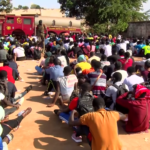
When the call to serve becomes a call to sorrow, the soul of a nation trembles. What happened at the El-Wak Sports Stadium was more than a stampede — it was a cry of despair from Ghana’s youth, a generation suffocated by unemployment, mismanagement, and years of broken promises. Six young people died not in defence of their country, but in pursuit of the chance to serve it.
The morning of 12th November 2025 will forever be etched in Ghana’s history as one of heartbreak, sorrow, and avoidable tragedy. Six young Ghanaians — full of dreams, hope, and ambition — lost their lives in a stampede at the El-Wak Sports Stadium during the Ghana Armed Forces’ 2025/2026 recruitment exercise. Several others sustained severe injuries, with some still battling for their lives at the 37 Military Hospital.
What was meant to be an opportunity for national service turned into chaos and death — a grim reminder of the deep-rooted desperation gripping Ghana’s youth.
According to official reports, the incident occurred around 6:20 a.m. when an unexpected surge of applicants forced their way through the gates, breaching security protocols. Only one side of a double metal gate had been opened, creating a deadly bottleneck as thousands of job seekers struggled to enter. The result was catastrophic — lives cut short, bodies trampled, and dreams shattered in seconds. Most of the victims were young women, their bright futures extinguished in the most tragic circumstances.
This was not a natural disaster. It was not fate. It was human error — the result of poor planning, weak crowd control, and shocking administrative negligence. Those responsible must be held accountable. Heads must roll.
For a disciplined institution like the Ghana Armed Forces, known for order and precision, this failure is inexcusable. When six citizens die in an exercise supervised by one of the nation’s most respected institutions, questions must be asked — and answered truthfully. Who decided to open only one gate? Who ignored the warning signs of overcrowding? Who failed to ensure basic safety protocols were in place?
This tragedy goes beyond logistics; it is a mirror reflecting the desperation and hopelessness of Ghana’s unemployed youth. Thousands thronged the stadium not merely out of passion for military service, but out of sheer desperation for a stable income — for survival.
The Armed Forces recruitment represented more than national duty; it symbolised security in a country where permanent jobs are scarce and young graduates roam the streets endlessly searching for opportunity.
Ghana’s youth are not lazy; they are trapped in a system that has failed them. The stampede at El-Wak is not just a military issue — it is a national crisis. It exposes the painful truth that unemployment has become a national security threat. When thousands of frustrated young people are willing to risk their lives for a single job, the situation is dire.
While the decision to decentralise recruitment by regions was commendable, it clearly wasn’t enough. The regions themselves must be further broken down into smaller venues or multiple days to prevent such deadly congestion. The Ghana Armed Forces had the data on the number of applicants. They could have easily organised the exercise in manageable batches, spreading the process over several days or across multiple centres within the Greater Accra Region.
If the Ghana Police Service could successfully use digital systems to manage crowds and stagger recruitment sessions, why couldn’t the military do the same?
Amid the sorrow, there was a glimmer of responsible leadership. President Mahama and the Acting Minister of Defence immediately abandoned all engagements to visit the victims at the hospital and console grieving families. Their directive to halt the recruitment process until a comprehensive review is completed was timely and commendable. That is what leadership looks like — empathy backed by decisive action.
But leadership must go beyond visits and condolences. There must be justice for the dead and reforms for the living.
The Ghana Armed Forces — one of the country’s most respected institutions, built on discipline, courage, and national pride — must not allow this tragedy to tarnish its image. It must show that it can hold its own accountable. Those whose negligence caused this disaster must face the full weight of the law. Anything less would be a disservice to the memory of those six young souls who died chasing a dream of stability and hope.
Today, six families are in mourning. Parents who waved goodbye to their children that morning are now left with lifeless bodies to bury. Their grief is unimaginable. Their loss, irreversible. These were not nameless victims — they were the future of Ghana, cut down by a system that should have protected them.
May this tragedy awaken our leaders to the painful realities facing our youth. May it compel institutions to prioritise planning, safety, and human life above bureaucracy. And may the blood of the innocent lost at El-Wak remind every official that negligence has consequences — and that inaction can kill.
Six lives lost. A national shame. Accountability is not optional. Heads must roll.